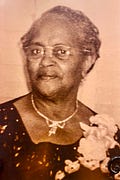In Week 16: Sunday Service Announcements, Katz Llale @Katzliale, Najah Amatullah @najahamatullah, and Jacquie Verbal @JacquieVerbal took me to church.
I didn’t expect to be so profoundly moved that my meditation afterwards evoked one of my Sunday School teachers, Mrs. Margie Bohler (1888-1977), from childhood. Except for occasionally coming across one of her son’s names, I hadn’t thought about The Bohler’s in decades.
Three excepts from each of these writers previously mentioned and a brief comment on how it showed up in my meditation. First from Katz Llale’s Writing the Walls of Jericho Down.
So I charge you today, my fellow writers, my fellow prophets, keep writing. Keep proclaiming. Keep believing that your words, your holy utterances, are the sound of Jericho’s end. For we are not simply speaking into the void; we are speaking life into the dry bones of this world. We are declaring to the powers that be: you may stand for now, but your days are numbered. With each word, with each sentence, we are pulling down strongholds, breaking chains, and writing the world into liberation.
My meditation was quiet until I heard the name Margie Bohler slip into my consciousness reminding me of my life as a child at Springfield Baptist Church (SBC), Augusta, GA, founded in 1787 and is reportedly the oldest Black Baptist Church in America and the place where Morehouse College was founded. I immediately remembered the many times she told us children to be quiet, stop fidgeting; or when she and her daughter,Frederica, hosted the junior choir or junior missionary board.
Members of SBC, including The Bohler’s were constantly “Writing the Walls of Jericho Down” as they encouraged the children and teenagers to write down our scriptures so we could memorize them for upcoming church events. The elders were convinced that we and they could tear down any walls of Jericho regardless of who erected them.
This was daring confidence in a segregated city during the 1950s when hangings were happening near our city, schools, and the department stores were still proving to be racist in their dealings with the Black community. It didn’t matter that many of the individuals who were the target of racist attitudes were also the cooks, maids, butlers, and other workers in the homes of the store managers and owners.
Then came Najah Amatullah with Noticing How I Feel Here. Our Sunday school teachers and babysitters (for they also babysat those of us whose parents couldn’t make Sunday School but would be at the Worship Service) seemed to be everywhere. If we looked “like the devil” had a hold of us, any number of repercussions might follow usually in the form of telling our parents we weren’t paying attention, separating us so that we couldn’t talk to one another during Sunday school or Worship, or maybe even a hand paddleas punishment for being disobedient.
After all, every adult had our parents’ permission to discipline us as they saw fit if we misbehaved. The adult’s job also included “Noticing How I/We [Felt There]”. Their watching us so closely was
The compound trauma of a thousand papercuts and a hundred small flesh wounds.
No child wanted to disappoint their parents or the adults at church who taught and cared for us.
We wanted to be liked and chosen to be in the various church programs especially created for children and teens.
We didn’t want to be sent to “mourning” bench—where sinners or the unbaptized (or misbehaved) sat—rather than sitting with our parents or permitted to sing in the children’s/youth choir. We didn’t want the paper cuts that would surely sting our skin and hearts as we were scolded for our sinful deeds.
Yes, Katz and Najah stirred my spirit and memories. Jacquie Verbal—Week 16: Sunday Service Announcements
added fuel to the fire with this statement:Smile through the pain, time heals and keep your faith.
That was just one of the many “Black church folks” Proverbs I grew up hearing. Regardless of what you did or didn’t do during Sunday school and/or Worship, “smiling through the pain would in time heal you if you just kept faith.”
The problem was we were children trying to learn what “faith” meant and why it was accompanied by “pain.”
Yes, Katz Llale, Najah Amatullah, and Jacquie Verbal were talking about writing; but so, too, were my Sunday school teachers, parents, and SBC members.
All of them wanted us to learn to write our scripture, biblical poems, and other religious ideology so that we’d grow up to become good and faithful servants of the Lord capable of knocking down Jericho.
Mrs. Margie Bohler was a Christian. She was educated and married to Mr. Lewis P. Bohler—one of the first Black mailman in Augusta, GA. Both were socially and civically engaged in activities in the Black (Colored was the term used in her lifetime) community. She knew about writing as she often served as the secretary for various church committees and even proofread sermons for her son, Rev. Lewis P. Bohler, Jr.
Mrs. Bohler and my grandmother, Mrs. Mattie Bell, were good friends. Their children were friends with one another.
One daughter, Fredericka Bohler, was director of the children’s choir at one point. I remember her and the times I went to their home for choir rehearsal. Even during choir rehearsal, I received lessons on Jericho falling, having faith, and understanding that “trouble/pain doesn’t last always.”
Week 16: Sunday Service Announcements continues to resound in my spirit. I’m grateful to Llale, Amatullah, and Verbal for their spirited expressions that awakened a fond memory from my childhood. Memories that helped shape the person and writer I am today.






Oh Dr Mary 🥹🙏🏾
This is profoundly humbling and so honoured to be mentioned on here.
Reading this also felt like being taken back in time with you. So I'm honoured and thank you.
Thank you for sharing!
"The problem was we were children trying to learn what “faith” meant and why it was accompanied by “pain.”